IBAC delivers blow to Daniel Andrews’ integrity
Daniel Andrews has dismissed an anti-corruption investigation that found ‘evidence of misconduct and improper influence’ among his senior staff, ministers and public servants.
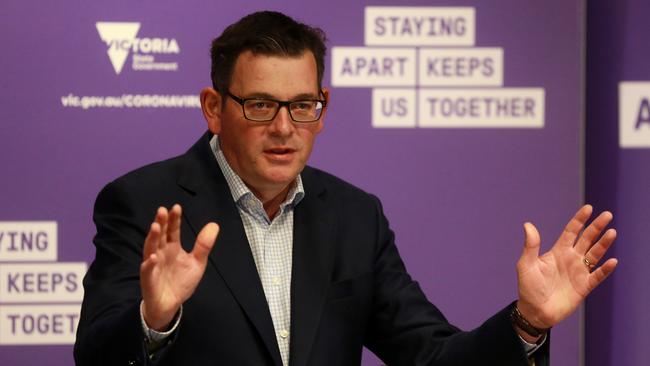
Daniel Andrews has launched an audacious defence of the integrity of his government, dismissing an anti-corruption investigation that found ‘‘evidence of misconduct and improper influence’’ among his senior staff, ministers and public servants as an “educational report” that “made no findings against anyone”.
The Victorian Premier’s defiant stance came as several senior Labor sources – including people who served as advisers, MPs and ministers during the period examined in IBAC’s Operation Daintree – strongly backed former health minister Jenny Mikakos’s testimony to the inquiry that power was centralised in Mr Andrews’ private office, which had “tentacles everywhere”.
In its report tabled in state parliament on Wednesday, the Independent Broad-based Anti-corruption Commission found that senior government advisers and public servants were acting in the “perceived interests” of ministers and the Premier in handing a $1.2m contract to the Health Workers Union on the eve of the 2018 Victorian election, without a competitive tender process.
Mr Andrews, former health ministers Jill Hennessy and Ms Mikakos, HWU boss Diana Asmar and senior political, public service and union staff were interviewed as part of the long-running inquiry, which began following a tip-off from an anonymous source almost four years ago. IBAC found the then Department of Health and Human Services failed to conduct a competitive process before giving the contract to provide occupational violence and aggression training to health workers to the HWU’s newly established “Health Education Federation”.
The watchdog found DHHS public servants had been “improperly influenced” by senior advisers in both the Premier’s and Ms Hennessy’s offices, and that further interference from an adviser to Ms Hennessy’s successor, Ms Mikakos and the Premier’s office “compromised the management” of the contract.
While acting IBAC Commissioner Stephen Farrow stopped short of finding evidence of “corrupt conduct” as defined by the IBAC Act, he found “breaches of the duties and obligations of ministers, ministerial advisers and senior public servants”, which “leaves the public sector vulnerable to significant risks of corrupt conduct occurring”.
Responding to the report on Tuesday morning, Mr Andrews said that as Premier he would lead a cabinet process to consider IBAC’s 17 recommendations.
“There are no findings against anyone in this report. It is an educational report, and they’re not my words. That’s the way in which IBAC themselves have described this,” Mr Andrews said.
“But the recommendations do go to a number of serious matters, important matters and we will give proper consideration as part of a proper cabinet government process to each of those.
“The staff members that are referred to in this report, they do not work for the government any more and have not worked for the government for years, and of course, as you well know, the two ministers who are referenced in the report are not even members of the parliament any longer.
“So, obviously, I am accountable and fundamentally responsible for driving a process to consider those 17 recommendations, to look at them very carefully, to potentially further engage with IBAC to seek their advice and then to respond once that work has been done.”
Mr Andrews declined to say whether he would commit to implementing any of the 17 recommendations, or meet deadlines set by Mr Farrow of formally responding to the report by October 31, and outlining intended action by June 30 next year.
IBAC cites evidence from Ms Mikakos describing the Andrews government as “very centralised with the PPO (Premier’s private office) having its tentacles everywhere”.
‘‘She referred to the constant tension between ministerial offices and the PPO,” the report says. “She described her handover meeting with Ms Hennessy as being principally focused on how interventionist the PPO and Premier had been in the health portfolio.”
Ms Hennessy is also quoted as saying there had been a “significant expansion” in the PPO since she entered the Victorian parliament in 2010.
Asked to respond to his former ministers’ concerns, Mr Andrews said: “I don’t think that’s accurate. I saw the comments. They’re not concerns that were raised with me in thousands of interactions with the two people you’ve just cited over 20 years, and in fact longer than that, actually.
“They are in the report. That’s fine. That might be their view. But again, what I’m disputing, or what I disagree with, is this sweeping contention that my office is not working hard to deliver all the election commitments we made, to deal with the challenges we confront as a state, and to get on and get things done.”
Several senior Labor sources, including people who were working as ministerial staff, MPs or ministers during the period examined by IBAC backed Ms Mikakos’s view of power being centralised in the Premier’s office.
“They do have their tentacles everywhere,” said a former staffer.
“The way it operates is highly centralised and command-and-control. That’s been the case since at least the beginning of the second term, where the media unit went from being answerable to each minister to after 2018 becoming PPO staff and accountable to that team. That’s when there was a more overt shift to centralisation and the pandemic only reinforced this.”
An Andrews government MP agreed. “In any situation where there’s a difference in view between ministerial offices and the PPO, we know which one’s going to win the argument,” the Labor MP said. “The centralisation of power is clear, to the frustration of many.”
The closest the Premier came to acknowledging any wrongdoing was in response to questions about evidence a senior member of his private office and adviser to Ms Hennessy had exerted pressure on public servants over the HWU contract. “Well it’s my view that people should behave appropriately. I don’t think that it is appropriate to be putting pressure on anyone,” Mr Andrews said.
Pressed over whether he was concerned about a culture in his government of political staff putting pressure on public servants – described in IBAC’s report as “a powerful example of the apparent increase in the pliability of the public service” – Mr Andrews said: “I don’t think there is any finding in this report that would see anybody reasonably conclude that there is such a culture.
“There’s an incident here, there’s an issue here. No one’s downplaying that, but you’ve just made a much broader point, which you’re entitled to make, a much broader point, and I don’t think that’s borne out by this report.”
John Pesutto said IBAC’s report went to “the heart of Daniel Andrews’ government, its abuse of power and complete lack of integrity”. “The Premier has been in power for more than eight years. How many more reports and corruption scandals do we need before the Premier understands that he is the problem?” the Opposition Leader said.
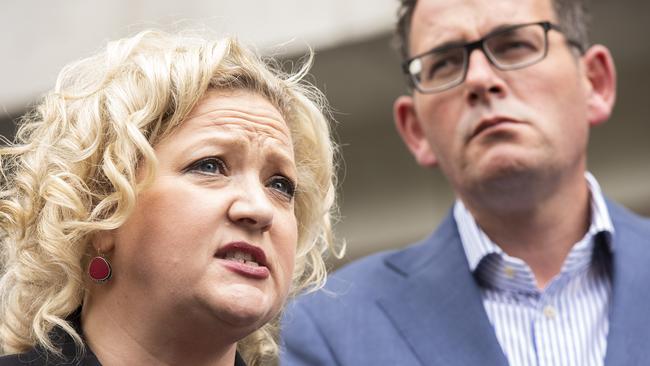
TIMELINE
IBAC was first contacted in May 2019 by an anonymous source who alleged that the procurement process for the HEF contract constituted serious corrupt conduct.
The watchdog initially handballed the matter to the Victorian Ombudsman on the basis that the allegations fell below its threshold for investigation, but commenced Operation Daintree in November 2019, after the Ombudsman identified evidence of pressure exerted on DHHS staff to award the contract to HEF, raising “considerable suspicion of corrupt conduct by a number of ministers and ministerial staff”.
IBAC’s probe involved 13 private examinations, 15 voluntary interviews, 19 summonses to produce documents and analysis of 25 terabytes of electronic data.
All of the interviews took place in secret, with the watchdog finding that the statutory thresholds for public examination had not been met.
IBAC examined interactions between Ms Asmar, the Premier’s private office, the offices of Ms Hennessy and Ms Mikakos, and senior executives and officers of DHHS who were responsible for selecting HEF to provide the training services and managing the contract.
The probe focused on the period from February 2018 onwards, when it found Ms Asmar began lobbying an adviser to the Premier’s private office with a proposal for HEF to be contracted to develop and deliver the training.
“Ms Asmar then lobbied the minister for health’s office from May 2018, where an Adviser to the minister helped the HWU shape an unsolicited proposal that HEF be contracted to deliver training to healthcare workers,” IBAC found.
“The Adviser then submitted that proposal to DHHS for consideration in June 2018. The interactions between the Adviser and DHHS staff led the public servants to believe that the government wanted to appoint HEF as the training provider.”
IBAC found that relevant staff in DHHS had “significant concerns” about the proposal, including the capacity of HEF to deliver the program, and considered that there should be a competitive procurement process.
“However, the active intervention of the minister for health’s Adviser led them to believe that the minister wanted HEF to be given the contract to deliver the training,” the watchdog found.
“After the Minister’s chief of staff said that the Minister would be unhappy about being asked to either approve a direct grant to HEF or a competitive procurement process, a deputy secretary of DHHS decided that the Minister did not need to provide instructions on their preferred procurement process.”
Following the deputy secretary’s authorisation of a non-competitive process in which only HEF was asked to provide a detailed tender to deliver the training services, DHHS awarded the $1.2m contract to the HWU-run organisation on October 30, 2018, hours before caretaker period began ahead of the November 24 election.
IBAC found Ms Hennessy’s adviser had worked with the Premier’s private office during September and October 2018 to draft a $2.2m election commitment to train 1000 health workers in partnership with the HWU.
“The commitment was drafted while the evaluation of the initial training proposal was being undertaken and on the assumption that HEF would be awarded the contract,” the watchdog found.
Mr Andrews was flanked by Ms Hennessy and Ms Asmar when he announced the election promise at the Austin Hospital on 23 October 2018 — seven days before the contract was signed with the HWU.
“After the contract was signed, serious concerns were raised by DHHS about the standard of training provided by HEF under the contract. However, intervention in 2019 and early 2020 by an Adviser in (Ms Mikakos’s) office, at the request of an Adviser in the PPO, dissuaded DHHS from taking steps to terminate the contract,” IBAC found.
Ultimately, HEF failed to deliver satisfactory course materials and had trained only 83 of a planned 575 health workers, having received $335,000 in contractual payments, when the scheme was suspended in March 2020 due to the Covid pandemic.
KEY FINDINGS
IBAC found DHHS failed to conduct a competitive process before awarding the contract to HEF, and that its decision was “driven by a belief by senior staff in the department that it was the minister’s and government’s preference, and due to pressure from the ministerial Adviser and secretary of the union.”
The watchdog deemed the reasons for only seeking a proposal from HEF to be “weak” and to have “ignored the concerns raised by the relevant teams in DHHS”.
“The HWU was given privileged access and favourable treatment in its access to ministerial offices,” IBAC found.
“The proposal from HEF raised a conflict between the government’s interest in procuring the most suitable supplier for the training and the governing party’s interest in assisting an affiliated union. This conflict of interest was not properly managed or declared.
“Ministerial advisers had an improper influence over the contract procurement and management processes.
“Advisers in the PPO and the new minister for health’s office (after the 2018 election) interfered in the management of the HEF contract to hamper consideration of its termination and ensure it continued.
“Conduct by senior public servants fell short of the required Victorian public sector standards.”
RECOMMENDATIONS
In response to its Operation Daintree findings, IBAC made 17 recommendations, which include measures to ensure that ministers have a clear understanding of their obligations and accountability for the management of ministerial staff, and that the role of ministerial advisers is made more transparent and accountable.
“IBAC has recommended the Victorian Government report to Parliament on the action taken in response to these recommendations by 31 October 2023, with a further report on those actions by 30 June 2024. We will follow up with all key stakeholders to monitor adoption of these recommendations to address the risks identified in IBAC’s investigation,” Mr Farrow said.
Specific recommendations include amending the ministerial code of conduct to ensure there is consistent understanding of the practical application of the Westminster conventions on ministerial responsibility, and requiring ministers to complete mandatory induction and regular training relating to the code.
IBAC also proposes that a Parliamentary Integrity Commissioner be empowered to investigate possible breaches of the ministerial staff code of conduct, and make recommendations for sanctions where an Adviser has breached this code of conduct.
The watchdog wants new legislation which would see ministerial advisers compelled to give evidence in limited circumstances, such as when a minister claims to be unaware of an adviser’s actions, and for the secretary of the Department of Premier and Cabinet or the Victorian Public Service Commission to include in their annual report information about the number of ministerial and other staff employed in each ministerial office.
IBAC is also arguing for protections for people who make legitimate or reasonable allegations of misconduct about a ministerial staff member.
PREMIER’S PATCHY MEMORY
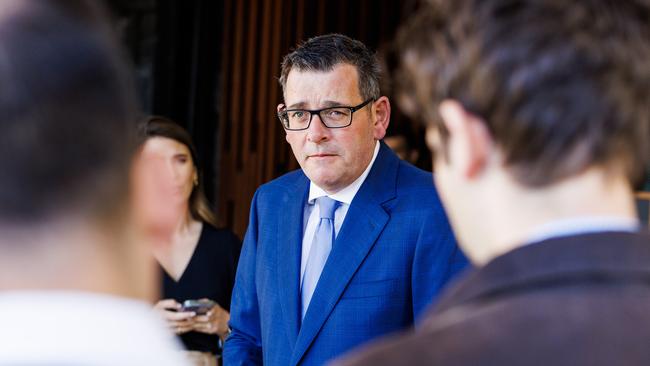
IBAC found the lack of oversight of advisers by ministers — offering “the potential for plausible deniability” — raised questions about the “efficacy of the Westminster convention of individual ministerial responsibility as an accountability mechanism to parliament, and, through it, the community”
“It is of particular concern that the Premier’s submission to the draft report suggests there is a ‘modern’ and ‘nuanced’ approach to the convention, but does not articulate what the standards now are that should be applied,” the watchdog found.
“These are matters which require parliament’s urgent consideration, so there is clarity for ministers, parliament and the public about the standards that are now to be applied if they have changed.”
IBAC confirmed Mr Andrews met with Ms Asmar on October 4, 2018, weeks before he and Ms Hennessy joined with Ms Asmar at the Austin hospital to make the election promise of the training program.
The watchdog heard evidence from Ms Hennessy’s health Adviser that the meeting “would not have proceeded on 4 October without prior discussion of what the election commitment would look like.”
“In his evidence, the Premier did not recall what was discussed in the meeting. Ms Asmar gave evidence that the meeting involved a discussion about the importance of occupational violence and aggression training for security officers.”
Mr Andrews had similar difficulty recalling his Austin hospital announcement, initially claiming in evidence to IBAC that it “did not involve a commitment to any particular provider.” “He was then played a video clip of his announcement that showed the commitment as being one in partnership with the HWU,” the watchdog found.
“The Premier had no memory of that commitment and could not say what the nature of the partnership was that he had referred to, but added that a ‘partnership’ with a union could take many forms and did not necessarily mean that it would provide the training.”
Mr Farrow found the extent to which Ms Hennessy and Ms Mikakos were aware of their advisers’ and DHHS’s conduct in relation to the contract remained “unclear”.
“However, despite their purported ignorance of the conduct, they remained accountable to parliament about it, including explaining what had been or would be done, if possible, to address the problems identified or prevent a recurrence of the problems in the future. It would be a matter for parliament to consider (if they were still ministers) whether the conduct of their advisers in this case was sufficiently serious for the ministers to be held personally responsible for it on the basis that they ought reasonably to have known about it,” the commissioner found.
“Similarly, the reliance both former ministers for health placed on their chiefs of staff or the advice, encouragement or requests emanating from the PPO did not relieve them, while they were ministers, of their accountability to parliament for their advisers and department’s conduct under the convention of ministerial responsibility including to the extent that it is codified in the code of conduct for ministers and parliamentary secretaries.
“Under the same convention and code, the Premier is similarly accountable to parliament for the improper conduct of his Adviser in relation to DHHS management of the contract with HEF (through their pressure on advisers in the Minister for Health’s Office in response to the HWU’s lobbying), notwithstanding his claimed ignorance of that conduct.
“It would be a matter for parliament to consider whether the conduct of his Adviser in this case was sufficiently serious for the Premier to be held personally responsible for it, on the basis that he ought reasonably to have known about it.”
‘WE’LL GRATEFULLY RECEIVE IBAC’S RECOMMENDATIONS’: ANDREWS
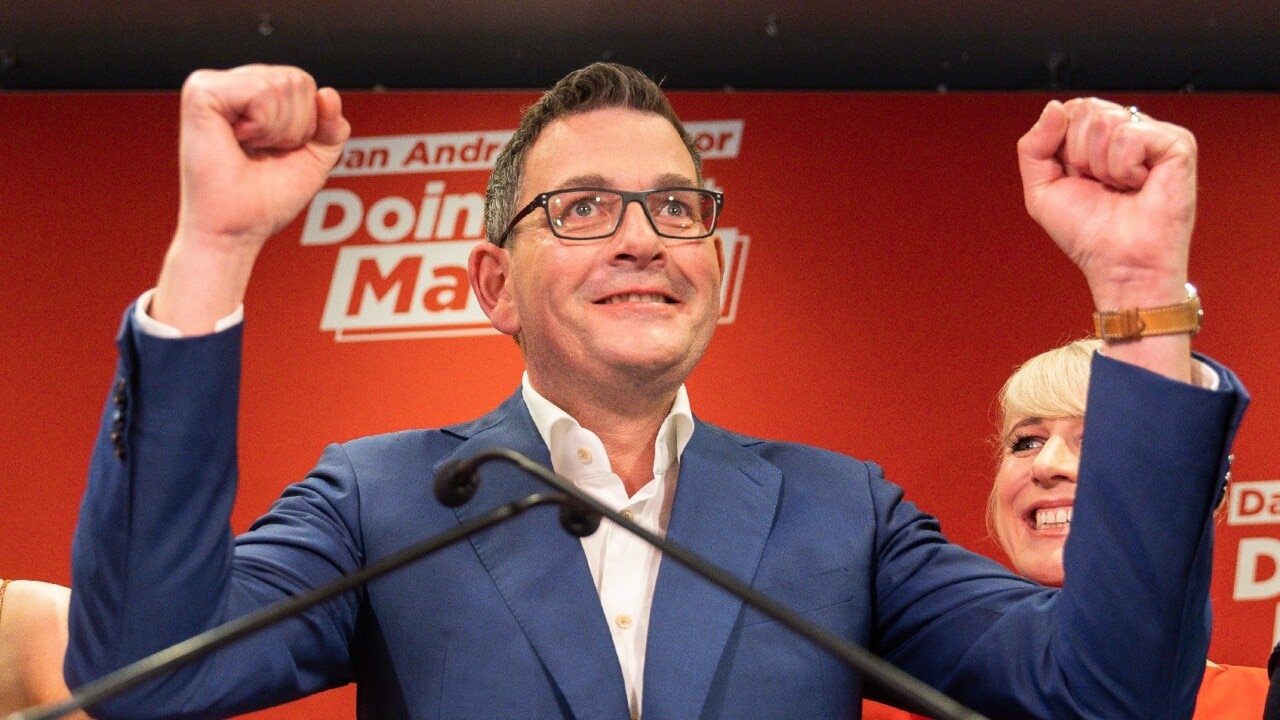
Asked on Tuesday whether he would act on any recommendations to implement new staff oversight measures, Mr Andrews said he would wait for the report to be tabled. “We’re always taking any recommendations from any integrity agency seriously, whether it’s the Ombudsman, IBAC or others. Our approach won’t change,” the Premier said.
“We’ll have a close look at that and we’ll be able to speak more freely … once that final report’s tabled under the relevant act. As I understand it, that will be tomorrow, so we’ll be able to speak to you tomorrow.
“I’m not sure whether I’ll be able to provide you with a definitive response, but certainly I’ll be able to give you a sense of what the government’s reaction to those recommendations is.
“It’s usually the case that we would take some time and have a look at those, work out what’s practical, what’s feasible, and then have a more detailed response at a later point.
“We are, after all, the elected government, and it’s for the government to make decisions on what changes are made, but we’ll gratefully receive the advice and the recommendations from that agency, as we have from many agencies over time.”
In March, Mr Andrews referred to former IBAC commissioner Robert Redlich as “a bloke who used to do a job, who’s written a letter I haven’t seen”, following the publication of a letter the latter wrote to parliament in which he accused the government of allowing “partisan politics” to intrude into the workings of the parliamentary committee that oversees IBAC.
When news broke of the IBAC probe ahead of last November’s state election, Mr Andrews released a statement declaring he acted “appropriately at all times and in all things” and disparaging reporting of the inquiry as “smear” “innuendo” and “media reporting based on anonymous sources”.
Asked on Tuesday whether he stood by repeated subsequent claims that he, his staff and his ministers “act appropriately at all times”, Mr Andrews said: “I behave appropriately at all times, and we’ll wait and see what the report says tomorrow in relation to others, and any other narrative or any other recommendations that are made.”
Operation Daintree, which IBAC took court action in November to try to keep secret, is the fourth time the watchdog is known to have privately interviewed Mr Andrews as part of one of its investigations.
The Premier has previously been interviewed as part of Operation Richmond, which examined negotiations between the United Firefighters Union and the government over firefighter pay; Operation Sandon, centred on allegations of corrupt property development deals in Melbourne’s southeast; and Operation Watts, which looked into branch stacking allegations within the Labor Party.


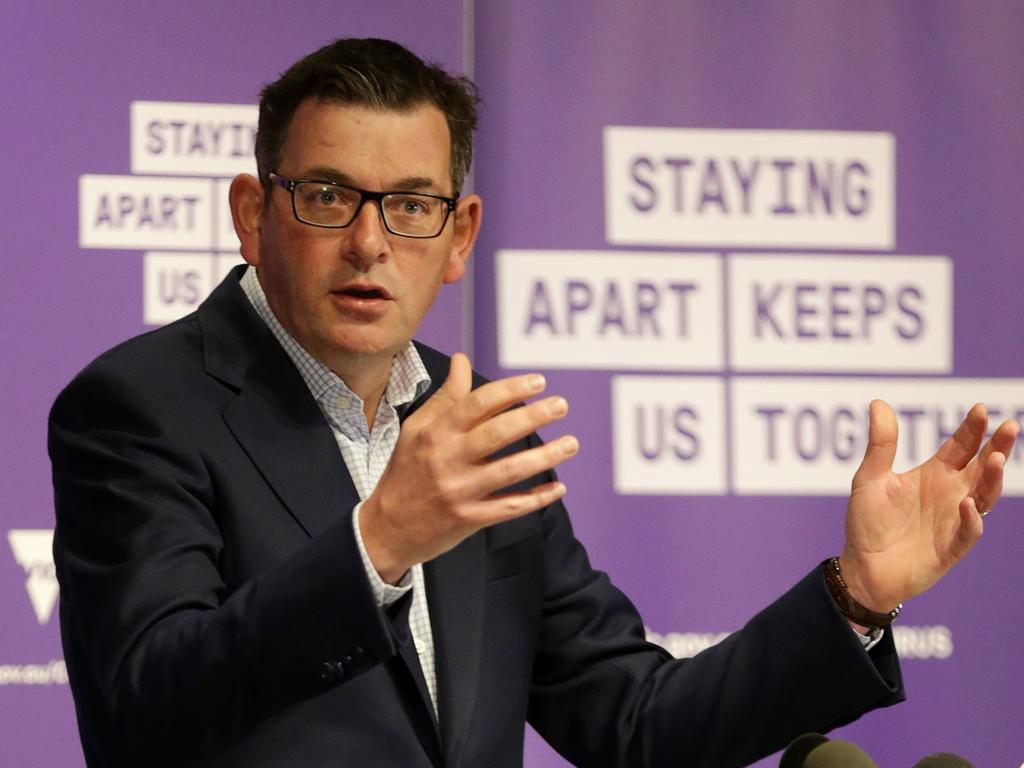


To join the conversation, please log in. Don't have an account? Register
Join the conversation, you are commenting as Logout